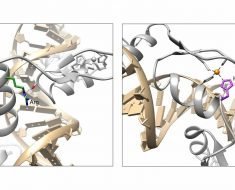Scientists have identified a pattern of genetic changes that could pick out men with advanced prostate cancer who are likely to benefit from immunotherapy.
Developing a genetic test to pick out these men could speed up the path of immunotherapy into use for prostate cancer patients.
A major clinical trial earlier this month became the first to show that immunotherapy could work in advanced prostate cancer—but only for about 10 per cent of men.
Now the new study, involving scientists at The Institute of Cancer Research, London, has discovered that testing the genetics of prostate tumours could identify the likely responders.
The research, published today (Thursday) in the prestigious journal Cell, found that men whose tumours had a distinct pattern of genetic changes could be much more likely to benefit from immunotherapy than otherwise.
The study was supported by funders including the Prostate Cancer Foundation and Stand Up 2 Cancer.
Scientists at The Institute of Cancer Research (ICR) worked with colleagues at the University of Michigan in the US to analyse tumour DNA collected internationally from 360 men with advanced prostate cancer that had spread.
They found that the tumours of 7 per cent of these men were missing both copies of a gene called CDK12, a trait that was linked with a unique pattern of additional genetic changes.
Tumours with this genetic profile contained a higher number of immune cells than other forms of advanced prostate cancer.
They also had a higher number of protein fragments on their surface, called neoantigens, which flag tumour cells to the immune system.Tumours that are associated with large numbers of immune cells and neoantigens often respond better to immunotherapy, presumably because the immune system has already begun to recognise elements of the cancer as foreign.
In a small pilot clinical study carried out in the US as part of the research, two out of four men with advanced prostate cancer whose tumours had CDK12-linked genetic changes responded remarkably well to the immunotherapy drug pembrolizumab.
It follows the results of a clinical trial led by the ICR and The Royal Marsden NHS Foundation Trust which showed pembrolizumab could benefit a subset of patients with advanced prostate cancer who had run out of existing treatment options.
In the new study, the pattern of genetic changes linked with the missing copies of the CDK12 gene was distinct from other, previously identified genetic subtypes of prostate cancer, making this an entirely separate form of the disease.
If the research can be replicated in larger numbers of patients, it could lead to introduction of a genetic test as a precursor to offering immunotherapy.
In future, CDK12 could also be explored as a genetic weakness that could be targeted by new precision drugs for prostate cancer. Professor Johann de Bono, Regius Professor of Cancer Research at The Institute of Cancer Research, London, said:
“Immunotherapy works for a relatively small group of men with advanced prostate cancer—but when it works, it really works. If we can identify in advance who will benefit, then it should accelerate the passage of immunotherapy into routine use for patients.
“Our new study has revealed a distinct group of men with advanced prostate cancer whose tumours have biological features that could make them likely to respond to immunotherapy drugs such as pembrolizumab.
“We now need larger clinical studies to further study the benefit of immunotherapy in this group of patients. In the future, a genetic test could help pick out men with this particular set of genetic changes, so that they can be considered for immunotherapy.”
Professor Paul Workman, Chief Executive of The Institute of Cancer Research, London, said:
“Increasing our understanding of the biological and genetic features of cancer is vital in the search for smarter, kinder cancer treatments.
“It’s exciting that this study may have cracked the underlying biology of why only some men with prostate cancer appear to respond well to immunotherapy.
“I look forward to this work being taken forward as soon as possible with the aim of ensuring that some men with prostate cancer can start having the same kinds of benefit from immunotherapy that we are seeing in other tumour types.”
Howard Soule, Ph.D., executive vice president and chief science officer of the Prostate Cancer Foundation, said:
Source: Read Full Article





